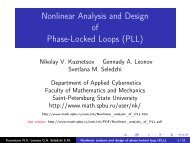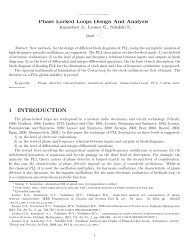Technical Sessions – Monday July 11
Technical Sessions – Monday July 11
Technical Sessions – Monday July 11
Create successful ePaper yourself
Turn your PDF publications into a flip-book with our unique Google optimized e-Paper software.
We model and explore search-based advertising auction with multiple slots, advertiser<br />
choice behavior and the popular generalized second-price mechanism.<br />
A Lagrangian-based method is proposed for solving this problem. This method<br />
includes two phases: (1) subgradient algorithm phase; (2) column generation<br />
phase. We present an extension to the method in order to improve the dual multipliers<br />
and accelerate convergence. Simulation results show that the proposed<br />
model is efficient and it shows significant improvement compared to the greedy<br />
algorithm.<br />
� TB-13<br />
Tuesday, <strong>11</strong>:00-12:30<br />
Meeting Room 206<br />
Mathematical Programming VI<br />
Stream: Continuous and Non-Smooth Optimization<br />
Invited session<br />
Chair: Luciana Casacio, FEEC, Unicamp, Rua João da Silva Martins,<br />
<strong>11</strong>92, 13274320, Valinhos, São Paulo, Brazil,<br />
luciana@densis.fee.unicamp.br<br />
1 - Convex Optimization in Sinusoidal Modeling for Audio<br />
Signal Processing<br />
Michelle Daniels, University of California, San Diego, La Jolla,<br />
CA, United States, michelledaniels@ucsd.edu<br />
Sinusoidal modeling is a method for analyzing digital audio signals in which a<br />
signal is decomposed into component sinusoids and residual noise. This work<br />
expands on an analysis process for building such a model which involves detecting<br />
and extracting sinusoids from the original signal. After identifying approximate<br />
frequency, magnitude, and phase for each sinusoid, parameters are<br />
optimized to minimize the energy in the residual. This problem is shown to be<br />
convex in magnitude and phase for known frequency. Results of the optimization<br />
are compared to non-optimized results and are promising.<br />
2 - Robust Design Model for Quality Control in Supply<br />
Chain with Quality Prevention Uncertainty<br />
Cuihua Zhang, Manaement Science and Engineering Dept.,<br />
Northeastern University, School of Business Administration,<br />
China, chzhang@mail.neu.edu.cn<br />
The robust operation of quality control in a multi-product, multi-stage supply<br />
chain consisting of a manufacturer and a buyer is studied. We develop an objective<br />
programming model. And the model is optimized consequently. The<br />
model guarantees coordination of supply chain operation, the maximum profit<br />
of the manufacturer and the buyer, and robustness under quality prevention uncertainty.<br />
The result of a numerical example shows that uncertainty of quality<br />
prevention to some extent cann’t change the quality control strategy .<br />
3 - Optimal Adjustment Algorithm for p Coordinates to Accelerate<br />
the Convergence of Interior Point Methods<br />
Carla Ghidini, Computational & Applied Mathematics, State<br />
University Of Campinas, Campinas, São Paulo, Brazil,<br />
carla@ime.unicamp.br, Aurelio Oliveira, Jair Silva<br />
Optimal adjustment algorithm for p coordinates is a generalization of the optimal<br />
pair adjustment algorithm for linear programming, which, in turn, is based<br />
on von Neumann’s algorithm. Its main advantages are simplicity and fast initial<br />
convergence. To accelerate the convergence of the interior point method few<br />
iterations of the generalized algorithm are applied into the Mehrotra’s heuristic<br />
to determine a good starting solution and in the transition between two preconditioners,<br />
since a hybrid preconditioner approach is used for solving the linear<br />
systems.<br />
4 - On Hybrid Preconditioners for Large-scale Normal<br />
Equations Arising from Interior-point Methods<br />
Luciana Casacio, FEEC, Unicamp, Rua João da Silva Martins,<br />
<strong>11</strong>92, 13274320, Valinhos, São Paulo, Brazil,<br />
luciana@densis.fee.unicamp.br, Aurelio Oliveira, Carla Ghidini,<br />
Christiano Lyra<br />
The hybrid approach for solving the linear systems arising from interior point<br />
methods uses two preconditioners. A generic one for the first iterations and a<br />
specially tailored one for the final iterations at the end. This work proposes new<br />
approaches for combining both preconditioners, designing new heuristics at the<br />
transition in order to solve large-scale linear programs still faster. Numerical<br />
experiments comparing with previous heuristics exhibit the good performance<br />
of the new approach.<br />
IFORS 20<strong>11</strong> - Melbourne TB-14<br />
� TB-14<br />
Tuesday, <strong>11</strong>:00-12:30<br />
Meeting Room 207<br />
Memorial Session in Honour of Professor<br />
Alexander Rubinov<br />
Stream: Continuous and Non-Smooth Optimization<br />
Panel session<br />
Chair: Andrew Eberhard, Mathematical and Geospatial Sciences<br />
Dept., RMIT University, GPO Box 2476V, 3001, Melbourne,<br />
Victoria, Australia, andy.eb@rmit.edu.au<br />
Chair: Regina Burachik, School of Mathematics and Statistics,<br />
University of South Australia, Mawson Lakes, 5095, Adelaide, South<br />
Australia, Australia, regina.burachik@unisa.edu.au<br />
Chair: Zari Dzalilov, School of Information Technology and<br />
Mathematical Sciences, University of Ballarat, 1, University Drive,<br />
3353, Ballarat, VIC, Australia, z.dzalilov@ballarat.edu.au<br />
Chair: Adil Bagirov, School of Information Technology &<br />
Mathematical Sciences, University of Ballarat, University Drive,<br />
Mount Helen, P.O. Box 663, 3353, Ballarat, Victoria, Australia,<br />
a.bagirov@ballarat.edu.au<br />
Chair: Alexander Kruger, Graduate School of Information<br />
Technology & Mathematical Sciences, University of Ballarat,<br />
University Drive, Mount Helen, P.O. Box 663, 3353, Ballarat,<br />
Victoria, Australia, a.kruger@ballarat.edu.au<br />
Chair: Musa Mammadov, Graduate School of Information<br />
Technology and Mathematical Sciences, University of Ballarat,<br />
University Drive, Mount Helen, P.O. Box 663, 3353, Ballarat,<br />
Victoria, Australia, m.mammadov@ballarat.edu.au<br />
Chair: Gerhard-Wilhelm Weber, Institute of Applied Mathematics,<br />
Middle East <strong>Technical</strong> University, ODTÜ, 06531, Ankara, Turkey,<br />
gweber@metu.edu.tr<br />
Chair: John Yearwood, School of InformationTechnology and<br />
Mathematical Sciences, University of Ballarat, Univerity Drive,<br />
Mount Helen, P.O. Box 663, 3353, Ballarat, Victoria, Australia,<br />
j.yearwood@ballarat.edu.au<br />
Chair: Patrick Tobin, Arts and Sciences, Australian Catholic<br />
University, St Patricks Campus, Victoria Pde Fitzroy, 3065,<br />
Melbourne, Victoria, Australia, patrick.tobin@acu.edu.au<br />
Chair: David Yost, Science, Information Technology and<br />
Engineering, University of Ballarat, PO Box 663, 3353, Ballarat,<br />
Vic., Australia, d.yost@ballarat.edu.au<br />
Chair: Xiaoqi Yang, Department of Applied Mathematics, The Hong<br />
Kong Polytechnic University, Hung Hom, Kowloon, Hong Kong,<br />
mayangxq@polyu.edu.hk<br />
Chair: Marco A. López-Cerdá, Statistics and Operations Research,<br />
Alicante University, Ctra. San Vicente de Raspeig s/n, 3071,<br />
Alicante, Spain, marco.antonio@ua.es<br />
Chair: Juan Enrique Martínez-Legaz, Departament d’Economia,<br />
Universitat Autònoma de Barcelona, 08193, Barcelona, Spain,<br />
JuanEnrique.Martinez.Legaz@uab.cat<br />
Chair: Vaithilingam Jeyakumar, Applied Mathematics, University of<br />
New South Wales, School of Mathematics, 2052, Sydney, NSW,<br />
Australia, jeya@maths.unsw.edu.au<br />
Chair: Moshe Sniedovich, Dept. of Mathematics and Statistics,<br />
University of Melbourne, Parkville, 3010, Melbourne, Victoria,<br />
Australia, m.sniedovich@ms.unimelb.edu.au<br />
1 - Memorial Session in Honour of Professor Alexander<br />
Rubinov<br />
Regina Burachik, School of Mathematics and Statistics,<br />
University of South Australia, Mawson Lakes, 5095, Adelaide,<br />
South Australia, Australia, regina.burachik@unisa.edu.au,<br />
Gerhard-Wilhelm Weber, David Yost<br />
45




